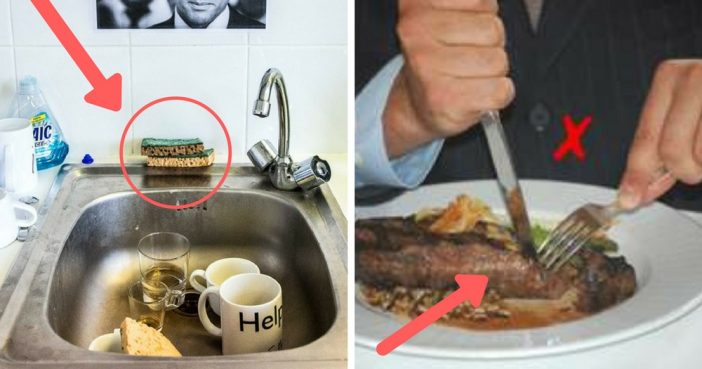
21. Using the same sponge over and over again
Sponges are one of the dirtiest, if not the dirtiest item in a kitchen. These tiny miracle workers often get overlooked when it comes to cleaning the kitchen because they’re usually the ones doing the cleaning. If you wash the dishes every day, you should be getting a new sponge at least once a month, or after 30 uses. Bacteria builds up very quickly on sponges and if not washed properly, you can spread the bacteria to all the items that the sponge touches.

22. Putting foods in the oven before it’s completely preheated
You need to allow your oven to fully preheat before sticking in your dish. Most items, especially baked goods, won’t cook properly if they’re placed in the oven before it’s completely preheated, so be patient and allow for it to warm up. Your food will actually cook faster in a preheated oven. You’ll enjoy your meal that much more, and you know what they say… patience is a virtue.
23. Making the oven too hot
No, cranking up the oven to 450 when the recipe calls for 350 won’t make your dish cook faster. In fact, it’ll most likely burn your dish and potentially cause your oven to smoke. Cooking is a chemical process that involves chemical reactions, which is why you have to follow the required temperatures to the fullest extent.
24. Only cooking from a recipe
While recipes are great, you should also know how to cook a few staple dishes on your own that doesn’t require one, like grilled chicken or pasta, because sometimes you just don’t have time to go to the grocery store and get all the needed ingredients that a fancy recipe calls for. To make this possible, you should be sure your kitchen pantry is stocked with the basics, so you can whip up a last minute meal quickly and recipe-free.
25. Underestimating the amount of time it’ll take
We’ve all done it. Started following a recipe and cooking a dish that we thought would take an hour that in reality ends up taking three. Obviously mistakes happen and sometimes you have no other choice than to start over from the beginning if you say, add too much salt or completely burn the fish, but it’s important to accurately calculate the amount of time it’ll take you to completely finish a dish, starting with ingredient prep to taste the first bite. A lot of people forget to add the chopping and prepping time. Just be mindful and realistic of the time you have and the time it’ll take to prepare, and know that time estimates on a recipe are that, an estimate, not a time set in stone.
26. Putting nice dishware in the dishwasher
What’s the point of spending $450 on a fine china dishware set only to ruin it in the dishwasher? If you’re using your fancy and expensive dishware, wash it by hand. You’ll regret being lazy and destroying it in the dishwasher. You should also avoid putting your sharp knives in the dishwasher as well as these eight other things.

27. Checking on your food too frequently
You know that old saying, “a watched pot never boils”? Well technically it’s wrong because yes, eventually your pot will boil, (assuming the stove is on of course), but whoever said it does have a good point. Hovering over your dish and checking it too frequently won’t cause it to cook any faster. In fact, it’ll probably slow down the cooking process. Every time you open the oven door, you allow cold air to seep in, therefore slowing down the process, so stop stirring, checking, and flipping, and just let your food cook.
28. Under-salting your foods
Salt gets a very bad rap when it comes to food and for good reason. Sodium is the culprit behind many horrible health problems like bloating, high blood pressure, heart failure, and an increased risk of strokes, just to name a few of the awful things that can happen if you consume too much salt. This is probably why people are scared to add this ingredient when cooking, but not putting enough salt in your dish will lead to a bland meal. Of course, if you can’t have salt per doctor’s orders, you shouldn’t add it, but if a recipe calls for a few tablespoons of salt, go for it.
29. Placing hot food in the fridge
There’s some disagreement among the experts about whether putting hot foods in a fridge is truly bad for your health, but the general consensus is that you should never put burning hot foods immediately in the fridge or freezer. Don’t be scared leaving foods out to cool, as it’s perfectly fine for most items to be left sitting out for up to two hours before putting in the fridge. If you’re trying to cool a dish waster, say soup, you can divide up the soup into smaller, shallow containers and place in the fridge to cool, but never stick a giant, deep hot dish directly in the fridge, as this may cause bacteria to grow.

30. Mixing in a too small bowl
There is absolutely nothing worse than mixing a batch of brownies and having the flour, sugar, and chocolate fly all over the place because the bowl is too tiny. This is extremely annoying and just causes a huge mess. So when it comes to mixing ingredients, always go big. The bigger the better, when it comes to bowls.

